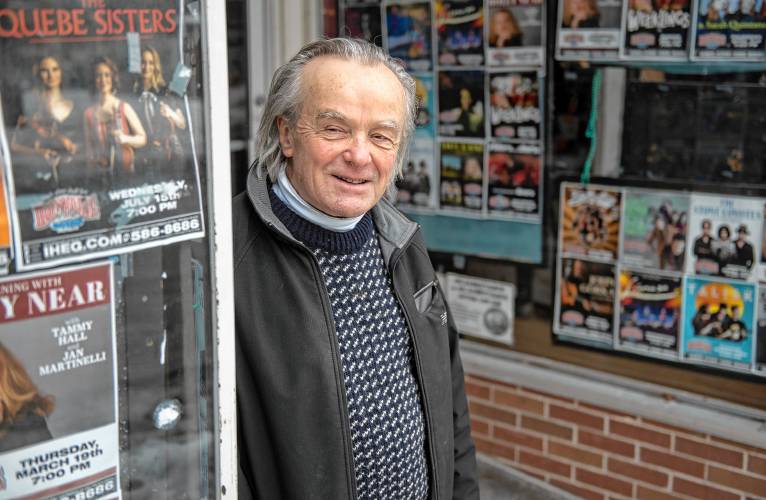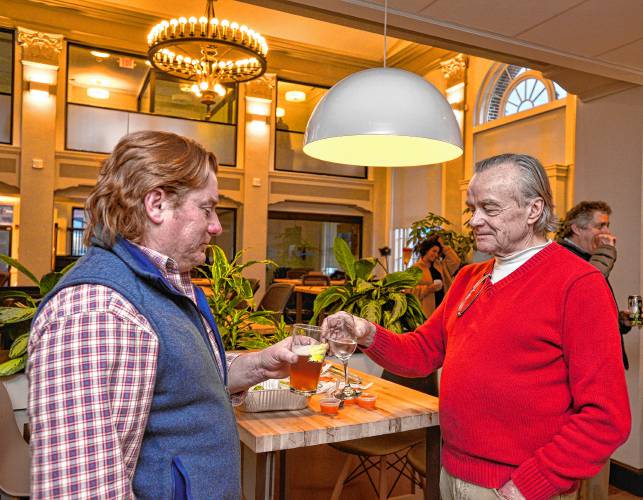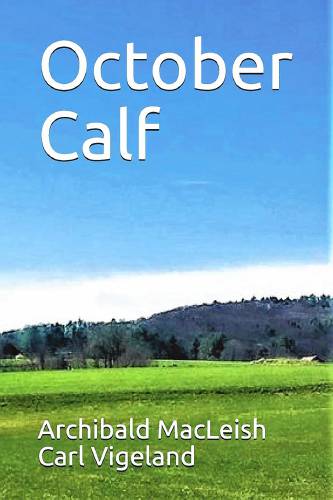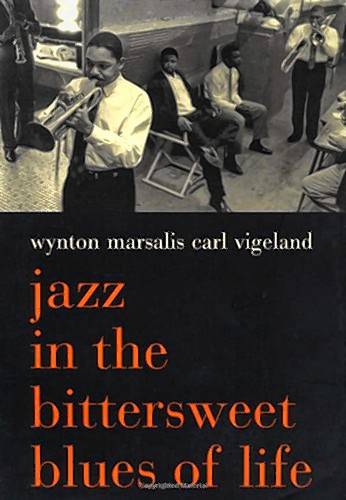Note: Carl Vigeland has been a long-time advocate member for the Amherst Golf Club . . . he has served as President and other positions on the Board of Directors, and is the ARHS golf coach.

Probing life’s connections and mysteries: Carl Vigeland looks back on different chapters of his life in two new books
By STEVE PFARRER
When Carl Vigeland looks back on his life and his writing, he’s struck by the connections that run through both.
The Amherst author has met and spent time with some notable figures during his life, in particular Archibald MacLeish, the noted poet and playwright (and three-time Pulitzer Prize winner) and more recently jazz trumpeter and composer Wynton Marsalis (another Pulitzer winner).
Those two men in turn, says Vigeland, have had a profound impact on him, both in energizing his writing and helping him find joy and inspiration in life — and both figure in Vigeland’s most recent books, “October Calf” and “Ricochet,” by Combray House Books.
In “October Calf,” Vigeland recalls how he met MacLeish in the early 1970s when he discovered the now-retired poet and professor was a neighbor of his in Conway. Vigeland, an aspiring writer in his 20s then working as a freelancer for the Greenfield Recorder, worked up the nerve to send MacLeish some of his writing — and what ensued was a steady exchange of letters over the next several years in which MacLeish’s letters went from being addressed “Dear Mr. Vigeland” to “Dear Carl.”
And in “Ricochet,” Vigeland looks back on a seminal experience in his life, when he went on the road with Marsalis for extended periods in the 1990s to write “Jazz in the Bittersweet Blues of Life,” a portrait of the musician as he became a huge name. “Ricochet” recounts, in part, some return trips Vigeland made with Marsalis in the 2000s with his teenage daughter, Maren, who’d been just a few years old when Vigeland first went on the road with the jazz great.
“As much as I enjoyed my time with Wynton, I felt a certain amount of guilt, because I could be gone from home for long periods of time,” the author said during a recent phone interview. “Part of my reason for taking Maren with me on the new trips was to try to make up for that, and also so that she could get a glimpse about what it had been like for me during that period of our lives.”
“Ricochet” uses alternating timelines and a bit of stream of consciousness writing, with Vigeland occasionally addressing his daughter directly as he looks back on the past.

“During one stretch of nearly a year when you were little I was away,” he writes, “three weeks at a stretch, then home for a week or so, and then gone again … searching for something, the bridge between my outer and inner worlds, certain I was about to find it at the next gig or town in a chance encounter with a stranger, a surprising conversation with Wynton or someone else in the band, a solitary moment standing to the side of the curtain …”
“By the time you were a teenager,” Vigeland adds, “I was still on the road, not as often in fact but still in feeling.”
Part of that feeling of wanderlust might have come from his affection for Marsalis, a supremely talented man who, Vigeland writes, never takes a day off, so focused is he on his music — but who also has “an enveloping curiosity” about the people he spends time with and is filled with “the wonder and elation” of simply being alive.
“Ricochet” also looks back on Vigeland’s relationship with his father, a professional organist who at one time was the artistic manager of the Buffalo Philharmonic Orchestra and whose difficult death weighed on his son for many years.
The through line between his joy at traveling with Marsalis and hearing him play, and his grief at this father’s end, is music, says Vigeland.
“Music has had such a huge impact on my life in different ways,” said Vigeland, who studied piano and trumpet himself when he was growing up. “I still see and feel those connections every day.”The neighbor on the hill
Indeed, among Vigeland’s dozen-odd books are “In Concert: Onstage and Offstage with the Boston Symphony Orchestra” and a biography of the late U.S. composer and music director Jonathan Sternberg. Vigeland, a former journalism teacher at the University of Massachusetts Amherst, has also been a freelance writer for various magazines and on different subjects, including sports.
“October Calf” is an introduction of sorts to Vigeland as a young writer, and it’s not a conventional narrative. He begins with a short section, titled “Neighbors,” in which he explains how in 1972 he came to learn MacLeish, then 80 years old and retired, lived just up the hill from him in Conway, and how he decided to write him a letter introducing himself as an aspiring writer, suggesting he (Vigeland) might pop by for a visit and get some advice from his learned neighbor.
MacLeish was a literary heavy hitter — Pulitzer winner in poetry and drama, former Harvard University and Amherst College professor, the Librarian of Congress during part of Franklin Roosevelt’s presidency — and it’s entertaining to read about Vigeland’s worry, when he doesn’t hear back for awhile from MacLeish, that’s he been way too presumptuous in contacting him.
“What could I have been thinking?” he writes.
But MacLeish did in fact write back, and though he declined a visit from Vigeland, he invited the young writer to send him some of his poems, fiction and other writing to offer feedback. And so began a regular correspondence between the two that lasted until MacLeish’s death in 1982 (the two men sometimes ran into each in town as well). “October Calf,” which is co-credited to MacLeish, reproduces many of MacLeish’s letters, as well as some of the fiction Vigeland shared with him.
“I was basically his last student,” said Vigeland. “He was really very generous to me, and that had a huge impact on my life.”
He says he decided to write both his new books in part because the pandemic and its enforced isolation has given him “oceans of time” to reflect on these past events.
But, more importantly, he says he wanted to share his experiences because “it reminds us of the goodness of people and that there are moments of great beauty in life, and that those moments are not exceptions to the awful things we see in the headlines every day — they are the things that really matter, not all the other crap.”
He remembers in particular a conversation he had with Marsalis years ago when their tour bus stopped in a small town in northern California. While the other band members stopped at a cafe for a quick bite, Marsalis and Vigeland strolled up the road.
“He said ‘We need to rap’ and he asked me what kinds of impressions I was getting from traveling with him and the band,” Vigeland said. “And then at some point he just looked around and said ‘You know, there’s a grandeur in life and we’re living it.’ I’ll never forget that.”
More information about Carl Viegland’s writing is available at carlvigeland.com.


























Off